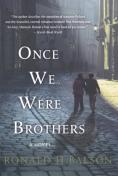BKMT READING GUIDES
Once We Were Brothers
by Ronald H. Balson
Paperback : 400 pages
36 clubs reading this now
14 members have read this book
The gripping tale about two boys, once as close as brothers, who find themselves on opposite sides of the Holocaust.
"A novel of survival, justice and redemption...riveting." ?Chicago Tribune, on Once We Were Brothers
Elliot Rosenzweig, a respected civic leader and wealthy philanthropist, ...
Introduction
The gripping tale about two boys, once as close as brothers, who find themselves on opposite sides of the Holocaust.
"A novel of survival, justice and redemption...riveting." ?Chicago Tribune, on Once We Were Brothers
Elliot Rosenzweig, a respected civic leader and wealthy philanthropist, is attending a fundraiser when he is suddenly accosted and accused of being a former Nazi SS officer named Otto Piatek, the Butcher of Zamosc. Although the charges are denounced as preposterous, his accuser is convinced he is right and engages attorney Catherine Lockhart to bring Rosenzweig to justice. Solomon persuades attorney Catherine Lockhart to take his case, revealing that the true Piatek was abandoned as a child and raised by Solomon's own family only to betray them during the Nazi occupation. But has Solomon accused the right man?
Once We Were Brothers is Ronald H. Balson's compelling tale of two boys and a family who struggle to survive in war-torn Poland, and a young love that struggles to endure the unspeakable cruelty of the Holocaust. Two lives, two worlds, and sixty years converge in an explosive race to redemption that makes for a moving and powerful tale of love, survival, and ultimately the triumph of the human spirit.
Excerpt
ONEChicago, Illinois, September 2004
BEN SOLOMON STOOD BEFORE his bathroom mirror fumbling with his bow tie. He was eighty-three years old and getting dressed for Judgment Day. Years had come and gone since he had last worn his tuxedo, but then, Judgment Day was a black tie affair. ...
Discussion Questions
1. Does it trouble you to think that remnants of the Nazi era may remain? Of the six hundred thousand SS members remaining at the end of the war, only a few thousand were actually brought to justice. Most escaped. Some to America. Only one hundred or so have been found and deported. Was Ben’s quest after all these years, in spite of Rosenzweig’s civic contributions, justified?2. Responding to someone who said, “I can't believe anybody cares about those events of so long ago,” Eli Rosenbaum, former head of the U.S. Office of Special Investigations, stated, “I think there’s particular value in showing would-be perpetrators that if one dares to perpetrate such crimes, there is a chance that he or she will be pursued for the rest of his or her life to locations thousands of miles from the locations of their crimes.” Where do you stand? Do you think we should continue seek out and prosecute now-elderly Nazi war criminals?
3. It is said that “first impressions are lasting ones.” What were your first impressions of the principal characters? At what point did your opinion change? Why?
4. Ben’s family had the opportunity to leave Europe at certain times in the story. When cousin Ziggy told them of the persecution in Germany and when Uncle Joseph came from Vienna, they could have all escaped through the mountains into Slovakia. Why didn’t they take advantage of each of those opportunities? Why did Jewish families remain?
5. From the diaries of survivors, there are many stories of extraordinary heroism, of ordinary people who, in the darkest moments, find unbelievable strength and courage. Have you known such people? Where do you think they find such courage?
6. If you had the opportunity to speak to any of the characters at any moment in the story, to whom would you choose to talk, what advice would you give, and what would you say?
7. Ben was a religious man, as was Catherine. If religious doctrine preaches that God is all-knowing and omnipotent, how does a religious person accept the existence of the Holocaust in God’s world?
8. Ethnic slaughter, the oppression of minorities, did not cease with the end of World War II. Does the world community today do enough to respond to the oppressors? What should be done?
9. Why did Elisabeth decide to turn against her husband? Did it have anything to do with her fear of facing Ben?
Suggested by Members
Book Club Recommendations
Recommended to book clubs by 11 of 11 members.
Book Club HQ to over 88,000+ book clubs and ready to welcome yours.
Get free weekly updates on top club picks, book giveaways, author events and more








